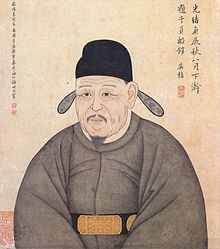Jeong Mong-ju
| Jeong Mong-ju | |
 |
|
| Korean name | |
|---|---|
| Hangul | 정몽주 |
| Hanja | 鄭夢周 |
| Revised Romanization | Jeong Mongju |
| McCune–Reischauer | Chŏng Mongju |
| Pen name | |
| Hangul | 포은 |
| Hanja | 圃隱 |
| Revised Romanization | Po Eun |
| McCune–Reischauer | P'o Ŭn |
Jeong Mong-ju (Korean: 정몽주, Hanja: 鄭夢周, January 13, 1338 – April 26, 1392), also known by his pen name Poeun (Korean: 포은), was a Korean civil minister, diplomat and scholar from the end period of the Goryeo Dynasty.
Jeong Mong-ju was born in Yeongcheon, Gyeongsang province to a family from the Yeongil Jeong clan. At the age of 23, he took three different civil service literary examinations (Gwageo) and received the highest marks possible on each of them. In 1367, he became an instructor in Neo-Confucianism at the Gukjagam, then called "Seonggyungwan", whilst simultaneously holding a government position, and was a faithful public servant to King U. The king had great confidence in his wide knowledge and good judgement, and so he participated in various national projects and his scholarly works earned him great respect in the Goryeo court.
In 1372, Jeong Mong-ju visited Ming Dynasty, as a diplomatic envoy. Around the time, as waegu (왜구/ 倭寇) (Japanese pirate)'s invasions to the Korean Peninsula were extreme, Jeong Mong-ju was dispatched as a delegate to Kyūshū in Japan, in 1377. His negotiations led to promises of Japanese aid in defeating the pirates. He traveled to the Ming Dynasty's capital city in 1384 and the negotiations with the Chinese led to peace with Ming Dynasty in 1385. He also founded an institute devoted to the theories of Confucianism.
Jeong Mong-ju was murdered in 1392 by five men on the Sonjukkyo Bridge in Gaeseong following a banquet held for him by Yi Bang-won (later Taejong of Joseon), the fifth son of Yi Seong-gye, who overthrew the Goryeo Dynasty, in order to found the Joseon Dynasty. Jeong Mong-ju was murdered because he refused to betray his loyalty to the Goryeo Dynasty. Yi Bang-won recited a poem to dissuade Jeong Mong-ju from remaining loyal to the Goryeo court, but Jeong Mong-ju answered with another poem (Dansimga, 단심가/ 丹心歌) that affirmed his loyalty. Yi Seong-gye is said to have lamented Jeong Mong-ju's death and rebuked his son because Jeong Mong-ju was a highly regarded politician by the common people. The bridge where Jeong Mong-ju was murdered, now in North Korea, has now become a national monument of that country. A brown spot on one of the stones is said to be Jeong Mong-ju's bloodstain, and is said to become red whenever it rains. Currently, his direct surviving descendants are his 28th and 29th generation, all of whom reside in South Korea and the United States.
...
Wikipedia
